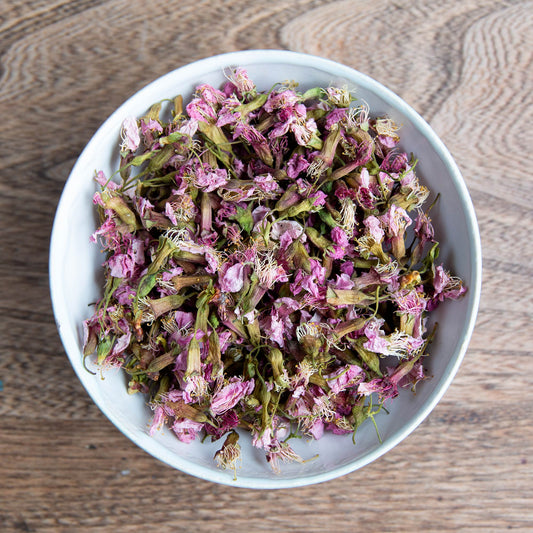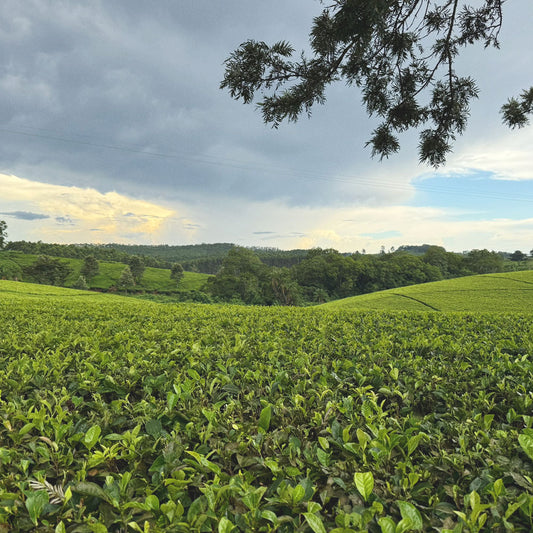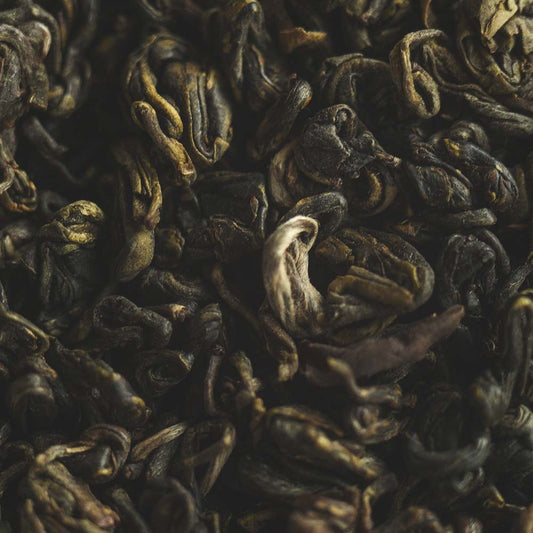Loose Leaf Nepali Tea
Our loose leaf tea from Nepal comes directly from the beautiful and exquisite Jun Chiyabari Tea Garden. We also source Tulsi Holy Basil (a herbal infusion) from a collective of female smallholders in Eastern Nepal. Read more...
Shop 5 Rare Tea Co Loose Leaf Nepali Tea Products
-
Rare Afternoon Tea
20 reviewsRegular price From $15.00Regular price$0.00 $0.38 per cup$0.00Sale price From $15.00 -
Nepali Himalayan Spring
15 reviewsRegular price $30.00Regular price$0.00 $1.00 per cup -
Nepali Himalayan Black
15 reviewsRegular price $26.00Regular price$0.00 $0.65 per cup -
Nepali Gunpowder Green
Regular price $21.00Regular price$0.00 $0.28 per cup$0.00Sale price $21.00 -

 Caffeine Free
Caffeine FreeRare Nepali Cherry Blossom
2 reviewsRegular price $57.00Regular price$0.00 $0.95 per cup
You can taste every bit of love and care they put into the growing and crafting of these spectacular Nepali teas and herbs.
Does Nepal have good tea?
We've been asked, "does Nepal have good tea?". Hell yes! Our collection of loose-leaf teas and herbs from Nepal are some of the finest teas in the world.
Jun Chiyabari tea garden sits in the high Himalayas where the tea grows slowly, imparting incredible flavours and characteristics unique to teas from this extraordinary terroir. Of course you can get terrible tea from Nepal, in the same way you can get terrible wine from France. But that's not the incredible loose leaf tea we choose here at Rare Tea Company.
What kind of tea do they drink in Nepal?
In Nepal, black tea is the most widely drunk. Nepali milk tea and Masala Chai is most often the way tea is drunk in Nepal. Like a chai latte, this is a spiced black tea made in hot milk - for something like this try our Masala Chai tea or Golden Chai which can both be made into lattes.
They also produce amazing green tea and white tea but they are perhaps more popular in Europe and North America.
When Jun Chiyabari started out, many of the tea cultivars planted came from Darjeeling. However, after a steep learning curve with plenty of trial and error, Jun Chiyabari now puts special emphasis on mixed cultivars - you'll find a wide range of varietals from India, China, Japan and Taiwan.
They have even created their own - JO - Jun Chiyabari Original cultivar.
How is Nepali tea made?
Beyond organic, our Nepali tea is grown using regenerative farming practices. At Jun Chiyabari, Bachan and his team work with increasingly non-intervention methods to protect the rich but delicate biodiversity of this high Himalayan region. The garden follows organic farming principles and was certified organic in 2012.
Although the speciality tea that is exported from Nepal is usually described as 'orthodox' tea - made using more traditional methods to craft the leaves - Jun Chiyabari prefers to be known as crafting 'high mountain tea' because this better describes their philosophy in tea making.
How to make Nepali tea
How you prepare your tea depends on the variety - a black loose leaf tea benefits from a higher water temperature than a white tea from Nepal for example. We recommend checking the infusion instructions on each tea page for our guide. All of these teas can also be made into iced teas by cold infusing the tea leaves. Our Nepali Himalayan Spring tea in particular is wildly delicious and makes a great non-alcoholic alternative to wine.
Although many people enjoy milk in their black tea, we recommend drinking our Nepali Black Tea without milk or sugar to best appreciate its beautiful flavours and nuances.
All of our Nepali teas are loose leaf and not in tea bags to ensure you get the best flavour and your cup is free from any chemicals, bleaches or glues used in the production of industrial teabags.
Darjeeling vs Nepali green tea
India and Nepal are not only different countries but have different traditions in tea making. Even within each country, the terroir will vary - creating teas that differ from field to field due to factors such as soil composition and elevation throughout the mountains.
Although some of the original tea plants used at Jun Chiyabari were from Darjeeling, the tea grown in Nepal is different in flavour profile. Most Indian teas, specifically those from Darjeeling don't possess the same unique tropical fruit characteristics and aromas we have found in Nepalese teas.
Does Nepal tea have caffeine?
All our loose leaf teas from Nepal (excluding herbal teas) contain caffeine. If you are looking to buy decaf tea we recommend trying our range ofnaturally caffeine-free herbal infusions. We have the most delicious (caffeine-free) Tulsi from this high Himalayan region.














